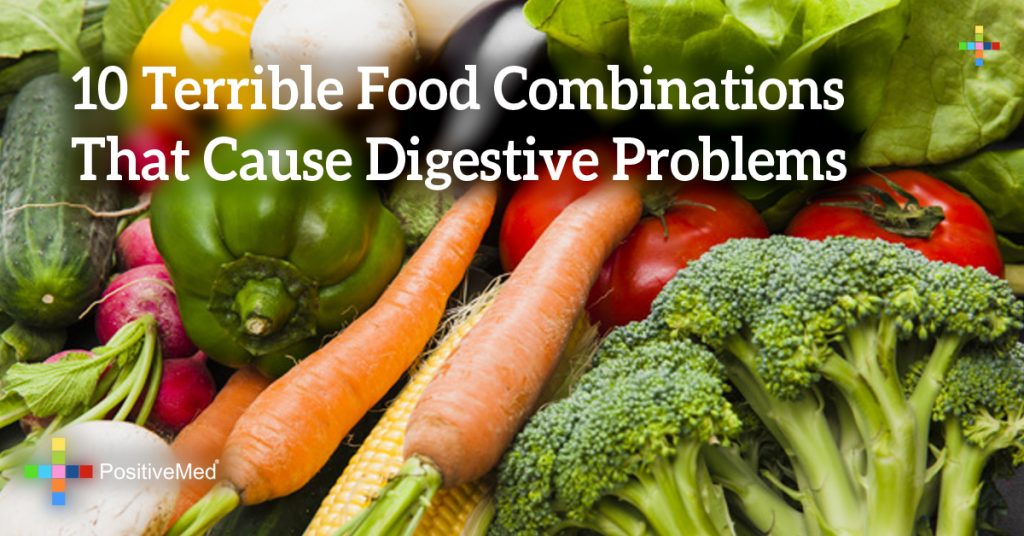
10 Terrible Food Combinations That Cause Digestive Problems
One in three Americans, has digestive problems. Studies indicate that correctly combining foods is critical, not only for providing your body with essential nutrients, but for eliminating heartburn, uncomfortable gas, and acid reflux. Food is processed in the mouth, stomach, and small intestine using two types of digestion; mechanical (chewing) and chemical. The two types of chemical digestion are markedly different. Acid digestion is required for proteins and alkaline digestion is needed for carbohydrates.

As food composition varies, the time required for digestion varies, as well. Fruits are digested in less than an hour, while vegetables, beans, and grains take up to two hours. Cooked meat, including fish, require three to four hours and shellfish takes four to eight hours to digest. Following are ten incompatible food combinations that compromise the digestive system.
1. Proteins and Starches
Many American favorites such as hamburgers with a bun, spaghetti and meatballs, and so on, are antagonistic. Dr. Herbert Shelton, the champion of the original Natural Hygiene ideas, states that when mixed together, an acid food such as protein, and starch, an alkaline food, don’t digest. The chemicals neutralize each other so that meat will begin to decay within the stomach.
2. Fruits and Starchy Vegetables
Fruits are mechanically digested in the stomach, but chemically digested in the small intestine. Vegetables begin breaking down in the mouth and take longer to digest than the fruit. By the time the stomach does release the food, the fruit has fermented.
3. Liquids and Eating Meals
Liquids in the stomach dilute digestive enzymes inhibiting the digestion process.
4. Multiple Proteins Together
Proteins necessitate different courses of action to digest. When meat is eaten, there is an intense enzymatic response in the first hour. Milk and eggs require longer time frames to be digested.
5. Pure Fats and High Starches
Starches, including cereal, bread, pasta, potatoes, and rice require alkaline digestion which occurs mainly in the small intestine. Fats, such as butter, bacon, or cream need bile salts from the gall bladder and liver to digest. Fat, emulsified by the bile, releases fatty acids, which neutralizes the alkaline secretions in the small intestine. The undigested starches, then ferment, producing gas.
6. Melons with Any Other Food
Eaten alone, melons pass quickly through the stomach and are digested in the small intestine. When combined with other foods, the passage through the stomach is delayed, and the soft fruit quickly ferments.
7. Orange Juice with Cereal
Orange juice is an acid fruit. These fruits contain acid that breaks down enzymes that work to digest starches.
8. Tomato Spaghetti Sauce
Tomatoes contain acid and destroy the enzyme that is responsible for digestion of starches.
9. Protein and Sugar
A study at the Mayo Clinic revealed that sugars both restrain the release of hydrochloric acid in the stomach and also combine with the stomach acid. This restricts the stomach’s ability to digest protein, which produces more gastric juices that the sugar then combines with. The sugar, delayed from passing through to the small intestine, ferments.
10. Starch and Sugar
Sugar stops the secretion of the alkaline enzyme responsible for starch digestion. Starch digestion begins in the mouth, and without the proper enzyme, remains undigested. Sugar passes through to the small intestine and ferments before the release of the meal.
Vilhjalmur Stefansson and Karsten Andersen extensively researched a high protein and fat diet. The results revealed that the body absorbs more vitamins and minerals when food is eaten in appropriate combinations. When a person frequently ingests incompatible food combinations, even though the food is nutritious, the body may receive little, if any, benefit. Furthermore, the person may be subject to a number of unpleasant digestive disorders.






